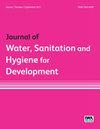Sustained effectiveness evaluation of two water systems installed in Haitian communities after the 2010 earthquake
IF 1.4
4区 环境科学与生态学
Q3 WATER RESOURCES
Journal of Water Sanitation and Hygiene for Development
Pub Date : 2022-12-21
DOI:10.2166/washdev.2022.054
引用次数: 0
Abstract
As a 2010 earthquake and cholera response project, in 2013–2014, an international non-governmental organization, working with local organizations, installed water systems in two Haitian communities. In 2016, 2 years after installation, we conducted a mixed-methods evaluation to assess sustained effectiveness, including 20 infrastructure assessments, 199 household surveys, water quality testing, 30 key informant interviews, and financial analysis of two water committee records. One of 14 (7.1%) installed kiosks were functional during the evaluation, with 42–60% of survey respondents near installed sources reporting using system water for drinking. No household water sample had detectable chlorine residual and non-detectable E. coli, except when household water treatment was reported. Informants expressed appreciation for the project, and discussed difficulties with operations, maintenance, and community engagement. Revenue was initially sufficient for operations and maintenance, although not sustainable because lack of trust led to poor quality service and then lack of payment. While the functional kiosks did provide water to some residents, overall project sustained effectiveness was not reached due to operational and maintenance issues, and lack of governance and community engagement. We recommend future implementers of small-scale water systems in complex contexts like Haiti plan for the technical and social components necessary for sustained effectiveness.2010年地震后在海地社区安装的两个供水系统的持续有效性评估
作为2010年的地震和霍乱应对项目,2013-2014年,一个国际非政府组织与当地组织合作,在两个海地社区安装了供水系统。2016年,也就是该系统安装2年后,我们进行了混合方法评估,包括20项基础设施评估、199个家庭调查、水质测试、30个关键信息提供者访谈,以及对两项水务委员会记录的财务分析,以评估持续有效性。在评估期间,安装的14个售货亭中有一个(7.1%)是正常运行的,在安装水源附近的42-60%的调查受访者报告使用系统饮用水。除家庭用水处理报告外,没有家庭水样检测到氯残留和未检测到大肠杆菌。举报人对该项目表示赞赏,并讨论了运营、维护和社区参与方面的困难。最初的收入足以用于运营和维护,但由于缺乏信任导致服务质量差,然后缺乏付款,因此无法持续。虽然功能性的供水亭确实为一些居民提供了水,但由于运营和维护问题,以及缺乏治理和社区参与,整个项目的持续有效性没有达到。我们建议未来在海地等复杂情况下的小规模供水系统的执行者计划持续有效所需的技术和社会组成部分。
本文章由计算机程序翻译,如有差异,请以英文原文为准。
求助全文
约1分钟内获得全文
求助全文
来源期刊

Journal of Water Sanitation and Hygiene for Development
WATER RESOURCES-
CiteScore
3.10
自引率
11.80%
发文量
58
审稿时长
16 weeks
期刊介绍:
The Journal of Water, Sanitation and Hygiene for Development is a peer-reviewed journal devoted to the dissemination of high-quality information on the science, policy and practice of drinking-water supply, sanitation and hygiene at local, national and international levels.
 求助内容:
求助内容: 应助结果提醒方式:
应助结果提醒方式:


